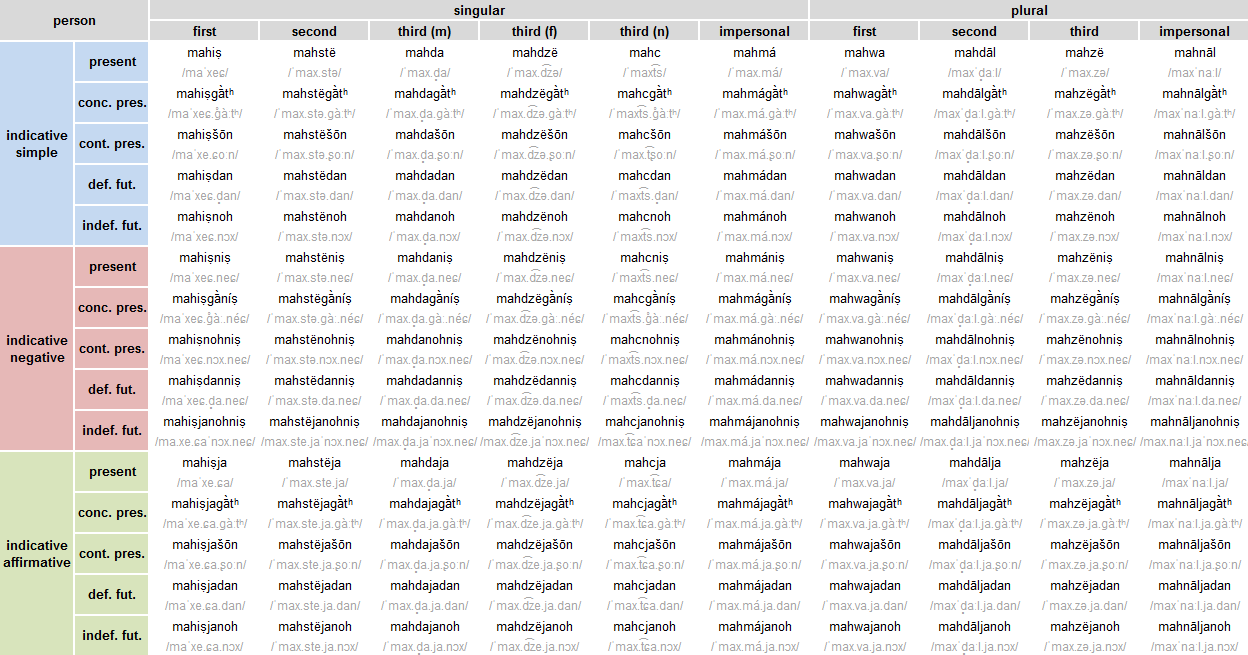Oh god, it's been a bit time since my last post but I was just too lazy to write another post. Procrastination!
![:'( [:'(]](./images/smilies/icon_crying2.png)
I did other things the last two weeks but I've thought about Noattȯč from time to time and I think I'll just post something quick here, nothing big.
Fourth Person
Noattȯč introduces a regularly used fourth person (or
Pazȯn Fi which comes from

Person vier, because I haven't figured out ordinal numbers yet). It's used when a person isn't specified, so it's an indefinite person. The fourth person singular generally means
one, for example like in "One does not do that". It's also often found in instructions of all kinds. The fourth person plural generally means "everybody". Both forms often imply what a person should do in the speaker's point of view as well. The source of the singular suffix is the German word
man which is already often used this way but it's use will increase in Noattȯč. The plural suffix comes from the word
jeder, hence this form is stressed like the second person plural: on the first syllable of the suffix. And as always, examples!
Tu̇qmannıḥ.
[ˈtuːʔ.ma.nnɪç]
tu̇-qman-nıḥ
do-4SG-NEG
Kapiċėna!
[ka.pi.ˈtʃeː.na]
kap-iċėna
understand-4PL
The first sentence means "one does not do that" and the second one means "everybody understands that".
Vocabulary I: Days & Months
I thought I'll post some vocabulary as well today! The first lesson are the days of the week and the months of a year because that's something I can do quite fast now. I won't list which gender they belong to because all of them are male nouns (or they're male when they're actually used as nouns).
day - tȧk
[ˈtaːk] etym. Tag
Monday - Mȯntah
[ˈmoːn.tax] etym. Montag
Tuesday - Dictah
[ˈdiːts.tax] etym. Dienstag
Wednesday - Mıvvah
1 [ˈmɪ.wwax] etym. Mittwoch
Thursday - Donastah
[ˈdɔ.nas.tax] etym. Donnerstag
Friday - Ffȧtah
[ˈfːaː.tax] etym. Freitag
Saturday - Zamctah
[ˈzamts.tax] etym. Samstag
Sunday - Zontah
[ˈzɔn.tax] etym. Sonntag
One thing that happens here is that the pronunciations of
 Tag/-tag
Tag/-tag split here. In every name of the weekdays, the colloquial northern German pronunciations becomes the standard while the pronunciation with the long vowel and the stop remains in the word for
day. However, the greeting, which stems from the same word, retains the colloquial pronunciation as well.
month - mȯnat
[ˈmoː.nat] etym. Monat
January - Javvȧ
[ˈjawːa] etym. Januar
February - Fėvvȧ
2 [ˈfe.wːa] etym. Februar
March - Mėc
[ˈmeːts] etym. März
April - Qappıl
[ʔa.ˈppɪl] etym. April
May - Mȧ
[ˈmaː] etym. Mai
June - Ju̇ni
[ˈjuː.ni] etym. Juni
July - Ju̇ri
[ˈjuː.ɾi] etym. Juli
August - Qoaƞust
[ʔɔ.ˈŋʊst] etym. August
September - Zemtemma
[zɛm.ˈtɛ.mma] etym. September
October - Qoƞtemma
3 [ʔɔŋ.ˈtɛ.mma] etym. Oktober
November - Nȯvemma
[no.ˈwɛ.mma] etym. November
December - Dėcemma
[de.ˈtsɛ.mma] etym. Dezember
1 the expected outcome would've been Mıvvoh but it changed to Mıvvah due to analogy with all the other days
2 the expected outcome would've been Fėppvȧ but it changed to Fėvvȧ due to analogy with Javvȧ, the expected form exists in older forms of Noattȯč but is obsolete in Modern Noattȯč
3 the expected outcome would've been Qoƞtȯma but it changed to Qoƞtemma due to analogy with the surrounding monthsI quite like what's explained in this section, especially because of how it's only really used in writing and how modern speakers might get confused over questions and statements in older texts.


